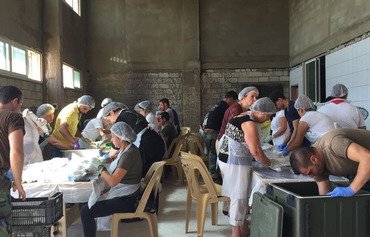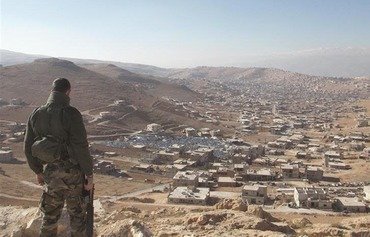Residents of the Hizbullah stronghold of southern Beirut have been under strict security restrictions since a wave of suicide bombings struck the border town of al-Qaa at the end of June.
The Lebanese army, backed by elements of the Republican Guard, is manning checkpoints and barriers at all main entrances to the area, inspecting vehicles and people entering the area, especially at night. Hizbullah militiamen are also heavily patrolling the area.
Experts and witnesses told Al-Mashareq that the heightened measures are a consequence of the al-Qaa bombings in that they exposed how Hizbullah's and Iran's meddling in Syria has made Lebanese citizens the target of the "Islamic State of Iraq and the Levant" (ISIL) and other extremist groups.
"I noticed that security measures have been tightened since the beginning of July, and I take note of their consequences on a daily basis because I work outside the area and return to my home in Haret Hreik at night," said Jamal Mansour, a resident of the southern Beirut.
"Such a scene raises fears in me because I sense that security threats loom over the area," he said.
This sense of unease has grown more severe, he said, because of "Hizbullah’s intervention in the war in Syria, which has made our area a target for [ISIL’s] terrorist and destructive acts".
Fears of infiltration
On June 27th, in the Lebanese village of al-Qaa near the border with Syria, eight suicide bombers blew themselves up, killing five people and wounding dozens.
"The events of al-Qaa were a serious indicator of the likelihood of infiltration into the Lebanese interior by terrorist elements," said retired Brig. Gen. Khaled Hamade, director of the Regional Forum for Consultancy and Studies.
What happened in al-Qaa was a "message to Lebanon that these groups are able to breach the Lebanese border to carry out terrorist acts", Hamade said.
Residents in the villages on the border with Syria are disgruntled with Hizbullah and are expressing "their discontent with the party’s involvement in the Syrian war, including rejecting the militia-like conditions these villages are living under", he said.
The security measures in southern Beirut are not new, Hamade said, because Hizbullah "set up its own security system in the areas in which it has a presence, including the southern suburb and several points around the capital, despite the deployment of the army, as a result of its involvement in the war in Syria, and the message sent via al-Qaa added another reason to increase the level of caution".
Hizbullah and other Iranian-backed militias have suffered massive casualties in the battle of Aleppo, he said, which has created a great sense of unease among Lebanese citizens.
"That is why [Hizbullah] does not mourn its fighters openly as it did in the past, and the funerals are held unannounced and without firing in the air and speeches. It is following a policy of concealment instead of a policy of mobilization," Hamade said.
Meddling in Syria
Political analyst George Shaheen echoed those sentiments, attributing the new security measures to the tension prevailing in Syria and Hizbullah's involvement in the war.
"One constant fact that does not come as a surprise to anyone is that whenever tension rises in Syria, it rises in Beirut as well, and specifically in the southern suburb, on the possibility that a reaction is forthcoming against Hizbullah," he told Al-Mashareq.
Shaheen said there is elevated concern that militants and extremists may exploit the security situation in Lebanon and carry out acts of revenge in southern Beirut and other areas.
"This concern stems from Hizbullah’s [involvement in the] siege of Aleppo, its latest offensive in the western Qalmoun region and seizure of the water springs in the Rankous area in Syria," he said.
In view of the threats issued by ISIL after the events in al-Qaa, the response was to tighten the already strict security measures in place in southern Beirut to guard against any reprisal by ISIL, Shaheen said.
"As long as the party’s continues to be involved in the war in Syria, the threats will continue to exist, and this calls for the security forces to take all actions [necessary]," he said.

![Soldiers from the Lebanese army search vehicles entering southern Beirut. Security measures have been ramped up in the wake of terrorist attacks in towns along the Syrian border. [Al-Mashareq]](/cnmi_am/images/2016/07/29/5934-Lebanon-Beirut-security-600_384.jpg)







Hezbollah is more honourable than everyone. It is the protector of Lebanon, but he who pretends not to know that Hezbollah is the protector of Lebanon, and hadn’t been for Hezbollah, the "Islamic State of Iraq and the Levant (ISIL)" would have killed Christians before anyone else. I don’t want to comment further.
Reply2 Comment(s)
We approve of Hezbollah’s intervention to help Syria. We will crush the Wahabi terrorism until we conquer Hijaz, God willing!
Reply2 Comment(s)